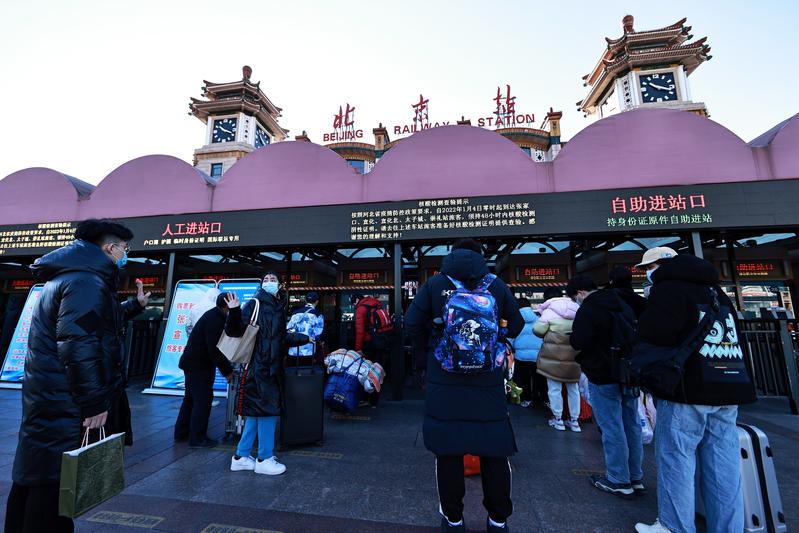 Passengers line up to enter Beijing Railway Station on Monday, the beginning of the 40-day Spring Festival travel rush. Chinese people will travel to visit their families during Chinese Lunar New Year, or Spring Festival, which falls on Feb 1. (ZHU XINGXIN / CHINA DAILY)
Passengers line up to enter Beijing Railway Station on Monday, the beginning of the 40-day Spring Festival travel rush. Chinese people will travel to visit their families during Chinese Lunar New Year, or Spring Festival, which falls on Feb 1. (ZHU XINGXIN / CHINA DAILY)
China's transportation sector is aiming to improve service quality during the Spring Festival travel rush, also known as chunyun, to make travel easier while also following epidemic control protocols, such as by setting up sites for nucleic acid tests at airports.
Monday marked the start of the 40-day Spring Festival travel rush, which will end on Feb 25.Due to sporadic COVID-19 outbreaks nationwide, this year's travel rush is posing extra challenges to the nation's transportation service providers.
A total of 1.18 billion passenger trips are expected to be made during this year's Spring Festival travel rush. And as it's not the first one since the start of the pandemic, transportation regulators have experience in providing better service while complying with epidemic control measures.
Railway passengers who lost or forgot to bring their ID cards can apply for an electronic ID card on a mobile phone application for temporary use on their journey, according to China State Railway Group, the national railway operator.
The railway service provider is also assisting elderly passengers with online services, such as buying tickets. When they use a registered mobile phone number to dial the railway information hotline, their calls will be given priority.
Contact-free services have also been expanded on trains and at railway stations to reduce the risk of spreading the virus. More vending machines have been set up at railway stations, and passengers are being encouraged to use online food ordering services on trains.
Beijing Daxing International Airport has established a 24-hour nucleic acid test site. Travelers can be tested without having to make an appointment, and their results will be available in two to four hours.
According to the latest epidemic control protocols, all travelers entering Beijing after Jan 22 are required to have a nucleic acid test no later than 72 hours after their arrival.
Beijing Capital International Airport has also launched a version of its mobile phone app that is tailored for elderly travelers. It includes access to services such as wheelchair leasing and free shuttle services inside the airport.


